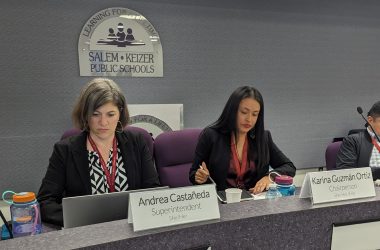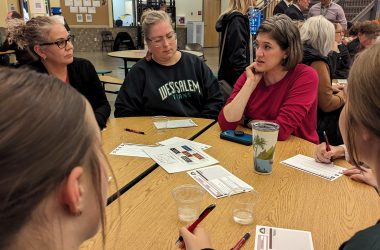 Students organized by Latinos Unidos Siempre urged the new Salem-Keizer School Board to address the mental health needs of immigrant students and stop policies that disproportionately punish students of color at a July 2019 meeting. (Rachel Alexander/Salem Reporter)
Students organized by Latinos Unidos Siempre urged the new Salem-Keizer School Board to address the mental health needs of immigrant students and stop policies that disproportionately punish students of color at a July 2019 meeting. (Rachel Alexander/Salem Reporter)
Latino community organizations are calling on Salem-Keizer School District leaders to push ahead with plans to improve bilingual education and mental health services next school year, even with budget cuts on the horizon.
“We all must work together to ensure that our children do not lose ground, and instead continue the upward trend of closing the achievement gap and increasing graduation. In the next few months, please reach out and include us in your decision-making processes,” wrote Annalivia Palazzo-Angulo, executive director of the Salem-Keizer Coalition for Equality.
Leaders of eight other organizations, including Latinos Unidos Siempre and PCUN, Oregon’s farmworker union, signed on in support. The May 26 letter was addressed to the Salem-Keizer School Board and the district budget committee.
The letter is an effort to salvage for students of color some of the school improvements that Salem-Keizer planned with money from the Oregon’s Student Investment Account. The account was intended to enhance local school budgets to tackle a variety of issues.
The district was to receive $36 million in the fall to be used for better serving students who have historically struggled in local schools, including bilingual students, those with disabilities, students of color and homeless students.
But as Oregon confronts budget shortfalls and significant drops in tax revenue from the coronavirus pandemic, it’s almost certain school districts won’t get the full amount they were expecting.
Districts are also facing significant drops in allocations they normally get from the state. Superintendent Christy Perry said the state’s latest projection would mean about $38 million less for Salem-Keizer next year without legislative action.
Perry said in an interview she expected much of what the Latino groups asked for would be possible. She and other administrators are looking for ways to include new initiatives but on a smaller scale.
Perry said she’s committed to not cut employees whose work is to close gaps for students, like the black and Pacific Islander graduation coaches who have helped boost graduation rates for both ethnic groups to historic highs in Salem-Keizer.
“Those positions have to be held harmless first,” she said.
Palazzo-Angulo said she knows the district can’t do everything it had planned, but outlined four priorities she wants in next year’s plans, based on discussion with Latino parents involved in the coalition.
Improving the district’s bilingual education in elementary school is a top priority, ensuring native Spanish speaking students learn to read proficiently in English while keeping their Spanish fluency.
Salem-Keizer’s plan called for hiring more coaches and mentors to help teachers at eight elementary schools improve English instruction for bilingual students. In the letter, community leaders urge the district to continue that plan on a smaller scale, with at least one elementary school that could serve as a model for bilingual teaching.
Mental health support is another priority, including hiring behavior specialists, counselors and social workers who “understand the intersection between race, ethnicity, language and poverty with adults’ perceptions of good and bad behavior.”
Palazzo-Angulo said district employees need to understand the school-to-prison pipeline, a term used to describe how students of color are more likely to face discipline at school than their white peers and may ultimately end up facing criminal prosecution.
That concern is heightened as students are expected to return to school this fall after months of stress from social isolation and the economic impacts of the pandemic.
“The stress and trauma both adults and children are going through, both at home and at school, can and will lead to negative interactions. The results will be devastating if we are not proactive,” the letter said.
The other two priorities cited by the group are continuing programs to recruit and retain more teachers and educators of color and bilingual teachers, and working to improve partnerships with youth while continuing to build connections with families.
“It’s an appropriate time to have a strong voice on the things you don’t want people to forget, the most important things out there, since there are going to be cuts,” Palazzo-Angulo said in an interview.
The district budget committee last week approved the budget for the 2020-2021 year that starts July 1, but it is certainly going to change. The approved budget, which by law must be approved before the new fiscal year starts, doesn’t account for the expected cuts or costs of the pandemic.
Any cuts in the new budget year will likely come later in the summer once the Oregon Legislature convenes and Gov. Kate Brown has decided how state spending should be reduced to account for steep drops in tax revenue.
Perry and district administrators would then propose cuts if needed, but school board and budget committee members would likely vote on a final plan.
Board chair Marty Heyen said it’s too early to speculate about what might be possible to save since the full impact of the state revenue slump on the district is unknown. She said she’d like to see the coalition’s priorities preserved so long as doing so doesn’t require cuts elsewhere to harm reduce services to students.
“The needs that were laid out by the coalition really are not necessarily needs for a particular group of children. All behavior issues and things they refer to in their document run through all cultures and societies, all our kids, all the different groups,” she said.
SUPPORT SALEM REPORTER’S JOURNALISM – A monthly subscription starts at $5. Go HERE. Or contribute to keep our reporters and photographers on duty. Go HERE. Checks can be sent: Salem Reporter, 2925 River Rd S #280 Salem OR 97302. Your support matters.
Contact reporter Rachel Alexander: [email protected] or 503-575-1241.

Rachel Alexander is Salem Reporter’s managing editor. She joined Salem Reporter when it was founded in 2018 and covers city news, education, nonprofits and a little bit of everything else. She’s been a journalist in Oregon and Washington for a decade. Outside of work, she’s a skater and board member with Salem’s Cherry City Roller Derby and can often be found with her nose buried in a book.









